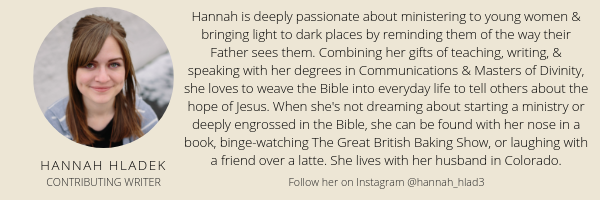God Uses Men and Women, Together
One of the most common problems confronting the Church today is determining the role God intended for women to play in the world.
With issues of gender equality and feminism on the rise in our current culture, it can be difficult for churches to identify and separate the intentions of God from the outcries of the world.
This isn’t anything new.
The Church has been wrestling with this topic for centuries; it seems no one truly knows where the line is that separates the roles of men from the roles of women in the church, workplace and home.
I’m not here to talk about feminism, gender-equality or to advocate for women’s rights.
What I want to talk about – what I think the entire Church should talk about more – is how men and women can work together, bringing their separate but equally as important strengths and gifts to the table to share the good news of Jesus around the world.
I want to talk about a story in the Bible that many people think is the story of just one man, but is actually the story of men and women working together to carry out God’s plans.
Moses is regarded as one of the most heroic characters in the Bible. But when we read Moses’ story a little closer, it becomes clear that he didn’t tackle all of these obstacles on his own. In fact, he had a network of people. He had men and women whom he relied upon and who supported him to bring to fruition the plan God had - not just for Moses individually, but for the entire nation of Israel.
Let’s talk about the five women who played a role in Moses’ story.
Before we start, though, let’s all take a breath and remember that we’re not reading about these women so that we can feel better than men, more important than men or have any sort of ammunition to use against men. That’s not what this is about. We’re reading about these women so we can remember that God uses women too, that we have a unique part to play in the world and that followers of Jesus are better when we work together to carry out our Kingdom work.
The Midwives
In the story of Exodus, Pharaoh commands all newborn Hebrew sons to be killed. This command came out of a fear that the Hebrew people would grow so large in number that they would overthrow Pharaoh and the empire he had constructed for himself. The Hebrew midwives, however, feared God (Exodus 1:17), and thus disobeyed the orders from Pharaoh in order to honor God. If the midwives hadn’t been so faithful to God, Moses would have been killed as a newborn. But as a result of their devotion to God, Moses’ life was spared.
Jochebed
If anyone reading this is a mom, you know the lengths you would go to for your kids. There isn’t anything you wouldn’t do to protect them. Moses’ mother was no different than you are today. And yet, there came a time when Jochebed could protect her son no longer (Exodus 2:3). Had Jochebed relied solely on herself to protect Moses, he likely would have been killed (and she along with him). But because she entrusted him to God, knowing God could protect her baby far better than she could, Moses’ life was saved.
Pharaoh’s Daughter
When the Egyptian princess found baby Moses floating in a basket on the river, a few things must have gone through her head. She must have known how angry her father would be if she showed up with a baby he had commanded be killed. She must have known how difficult it would be convincing others to treat him as a member of the Egyptian family. And yet, she cast away those thoughts in favor of offering this baby compassion, comfort and protection (Exodus 2:6). Quite literally, Moses’ fate was in her hands and instead of playing it safe, Pharaoh’s daughter chose to fight for life and love.
Miriam
Moses’ older sister, Miriam followed and watched after her baby brother as his basket floated down the Nile and up to where the Pharaoh’s daughter was walking. Imagine the fear Miriam must have felt as she watched an Egyptian pick up the basket that held Moses. I think if I had been Miriam, I would have fled to avoid watching my brother be killed. Instead, Miriam bravely approached the princess and persuaded her to have the baby nursed by his own mother. Miriam could have easily believed that it wasn’t the place of her – the daughter of slaves – to approach or speak to a royal. Instead, she seized an opportunity that ultimately provided Moses with the love of his own family (Exodus 2:7-9).
Zipporah
After Moses flees Egypt to Midian, he meets the priest of Midian, Jethro, and ultimately marries one of Jethro’s daughters, Zipporah. Later, when God calls Moses to go to Egypt to set the people of Israel free, Zipporah travels to Egypt with Moses, even though it wasn’t her people they were going to save. She could have very easily chosen to stay out of the fight and waited for Moses to return to her. Instead, she stayed with her husband and chose to fight beside him (Exodus 4:20). Moses’ story and success is every bit as much Zipporah’s story and success, because they were together, side-by-side, throughout.
Just like these five women, we as women today have a tremendously important role to play in the work God is doing. He wants to use us to impact and influence those around us. If we live believing we cannot be used by God – or worse, that He doesn’t want to use us – we’ll find ourselves sitting on the sidelines, watching the amazing things others are doing for the Kingdom instead of being out there doing amazing things ourselves. It isn’t about men versus women. It’s about men and women linking arms to bring about God’s will on earth as it is in heaven.


